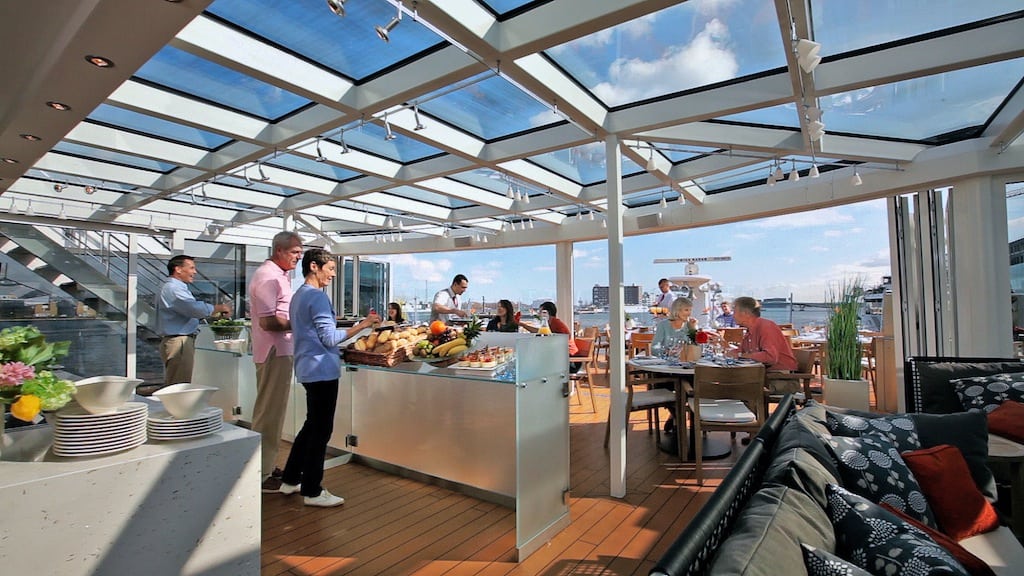Interview: Viking's Culinary Director on Connecting Cuisine and Culture on a River

Skift Take
As Viking Cruises director of culinary operations, Anton Brunbauer is responsible for creating menus for 25 different itineraries, sourcing local products in cities throughout Europe and Asia, training hundreds of new staff members, and connecting food to the culture that many cruisers come to learn about and experience.
Viking Cruises nearly doubled its fleet this month and tasked Anton with finding new and innovative ways to highlight regional cuisine.
The result?
A culinary concept in which all three levels of Viking's river cruise ships are turned into a local market that allow passengers to explore the snacks and scents of their destination.
Brunbauer previously worked for more than 20 years as executive chef at Hyatt and Westin properties in the U.S. and designed and opened food and beverage operations at four Navajo Nation casinos before joining Viking.
Now, when asked about possibilities on the river instead of land, Anton responds, "I think imagination is the limit."
We spoke to Brunbauer last week about how he plans to make cruise food more responsible, accessible, and delicious.
Skift: Can you describe your background and how you rose to this role?
Anton Brunbauer: My culinary background is mainly with food at Hyatt and Westin, but I always wanted to work for casinos, so I had the bright idea to work for Navajo Nation. I worked with Navajo Nation designing and opening four casinos and after a year and a half and I met a beautiful lady from Chile so I came back to Europe.
Out of the blue I applied with Viking as a chef...And it's been the best thing I've ever. I truly enjoy the business and I get to travel a lot.
Skift: What are your responsibilities as Director of Culinary?
Brunbauer: I am in charge of coming up with new concepts, menus, and very much involved with purchasing and PR. I still do some cooking with my corporate chefs and I like to get in the kitchen whenever possible.
Skift: How is working with river cruises different from large casinos?
Brunbauer: We have to be extremely organized because every square inch counts. The ordering of food has to be extremely organized and precise.
Logistically, loading is always a challenge. But from a cooking aspect, it's not. We have the most modern state-of-the-art equipment. One can not get any better.
Skift: Can you tell us about the process of preparing for so many new ships and customers? What are the challenges?
Brunbauer: It's our biggest investment so far so adding and training employees is a key factor. We have a good mix of nationalities, but because our customers are mainly English-speakers, English is a must, and that eliminates some employees in certain countries.
But we are very very well off. On the river, we are the employer of choice. We also have a lot of employees switch over from ocean, because we treat our employees well.
Skift: How do you balance the desire to feed guests with locally sourced food versus the sheer logistics involved in doing all those meals and snacks?
Brunbauer: We use a combination of both. We have manufacturers for some of the common stuff. But we get fruits, vegetables, and bread locally. It's not possible to have it all local, because we have to have consistency and standards from ship to ship.
About 60 percent of the menu is pretty standard and 30 to 40 percent is always regional. We also do 10 percent seasonal specialities. In Europe in the spring, we have asparagus. In the summer, we'll have mushrooms. And in the fall, we're doing cider.
We've also introduced a whole new concept on board. It's the 'Taste of' events and it breaks up the five-course dinner atmosphere. The entire ship, including the kitchen, is turned into a kind of market place and passengers really get to try 50-plus local dishes in one night. We also have regional drinks and entertainment.
We did a test run last year for three months on two ships and it was so well liked that we created a concept for every ship.
For me, the meal is about many factors and it's about the company. Here, people get to know each other better because they're not sitting at the same table in the same chair every day.
Skift: So you're able to introduce new meals and cuisine concepts?
Brunbauer: The opportunities are endless. The company allows me to be as creative as possible, which puts a little pressure on my because I like to be very creative and then I need to walk the talk.
Skift: Do you keep track of the popular meals onboard?
Brunbauer: Yes, the waiters are using a new app to take orders for the first time this year. It's important because they're spending more time with the guests instead of in the kitchen. And we can keep track of food sales, which allows me to make smarter choices about the menu cycles.
It's fantastic. It's really brining the systems and service in line. It all comes together, from a technology perspective, in 2014.
Skift: What's in store in the next one to three years?
Brunbauer: I want to bring in some healthier choices and to be a little stronger on dietary meats. It's going to be one of my main focuses in the next year.
It's been a great journey and a lot of fun. Since I started a year ago, it's nearly doubled. It's such a great problem to have. When you have growth, you can create and do things you usually only dream about. It's been a fantastic journey.




